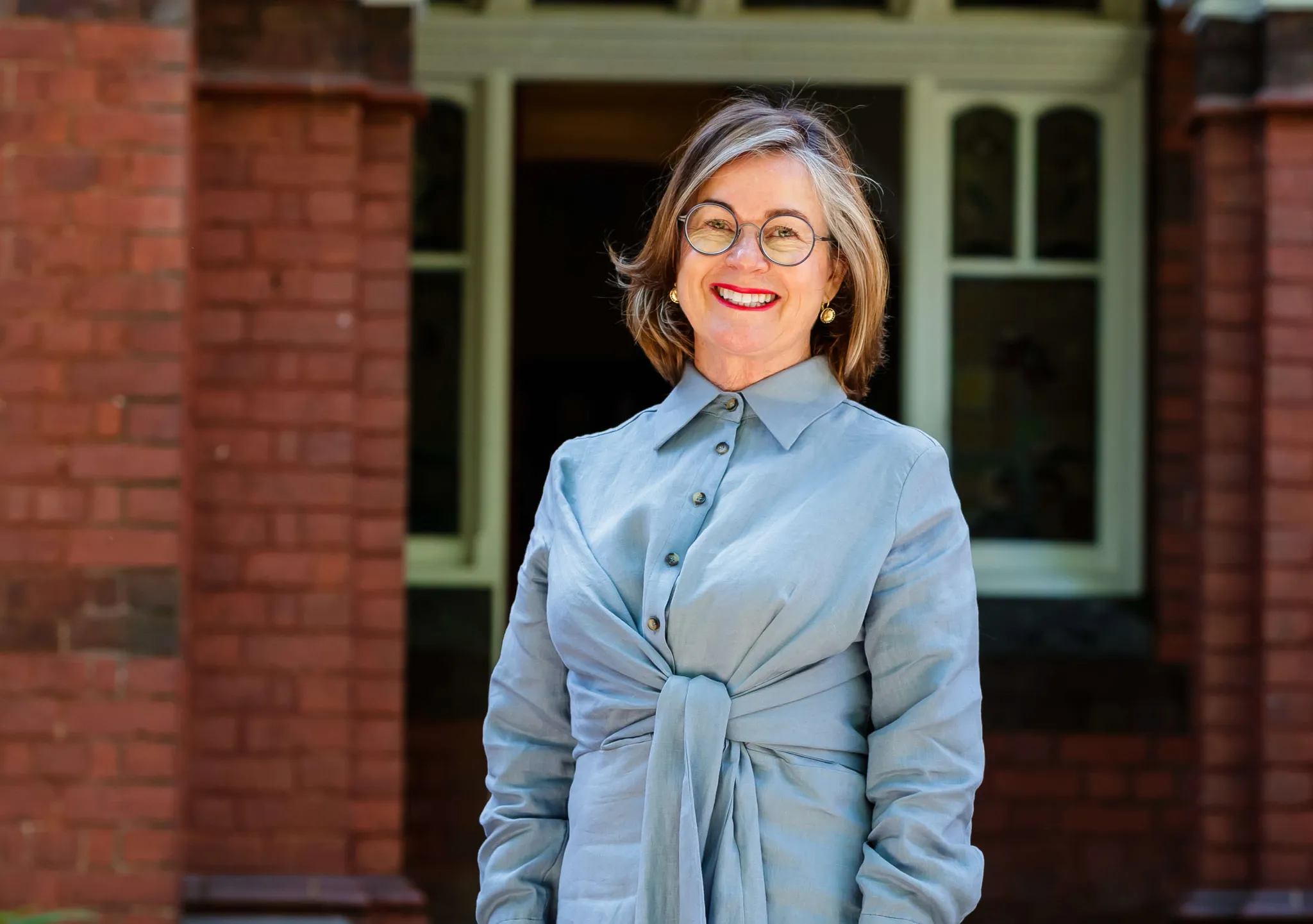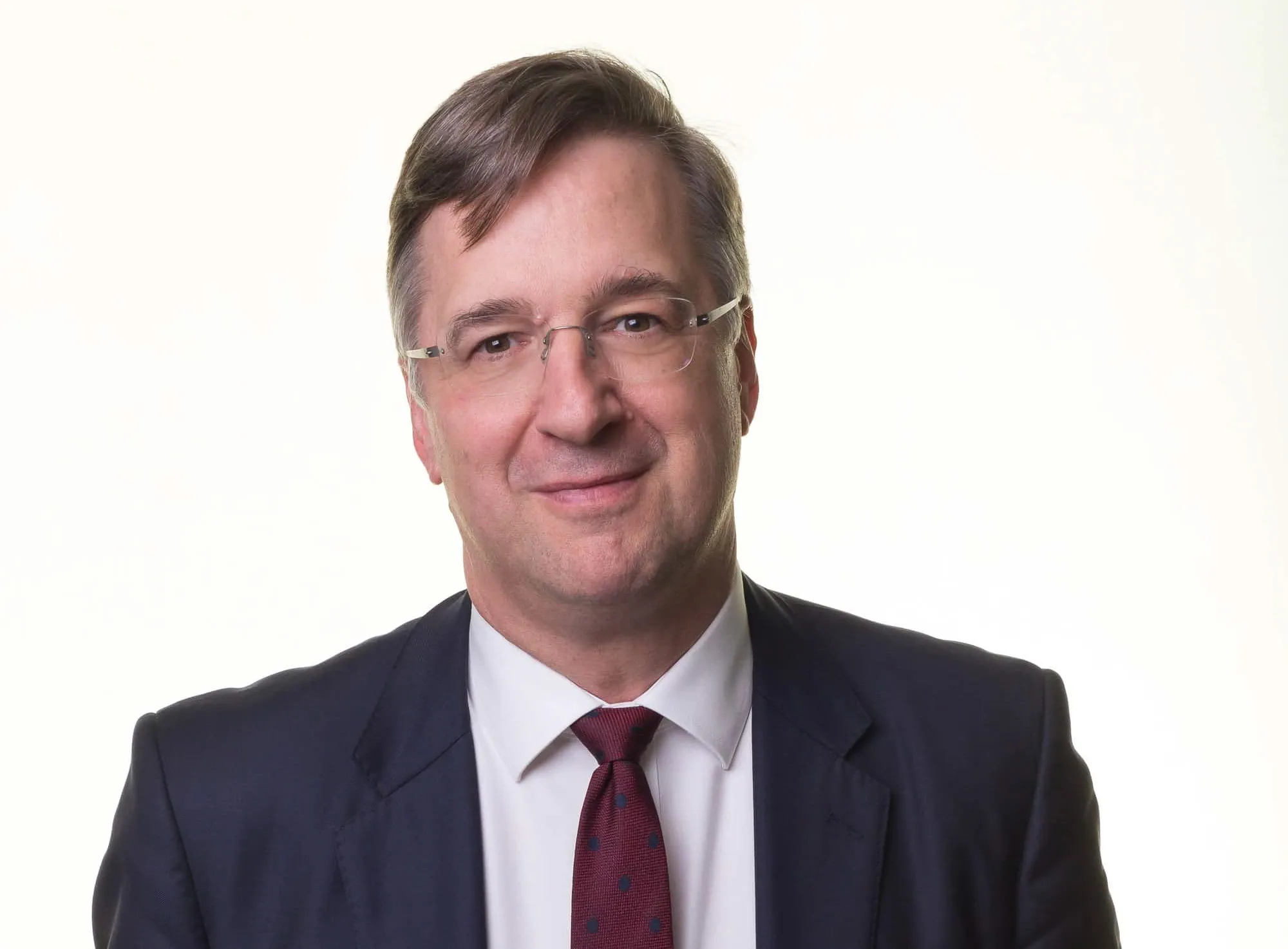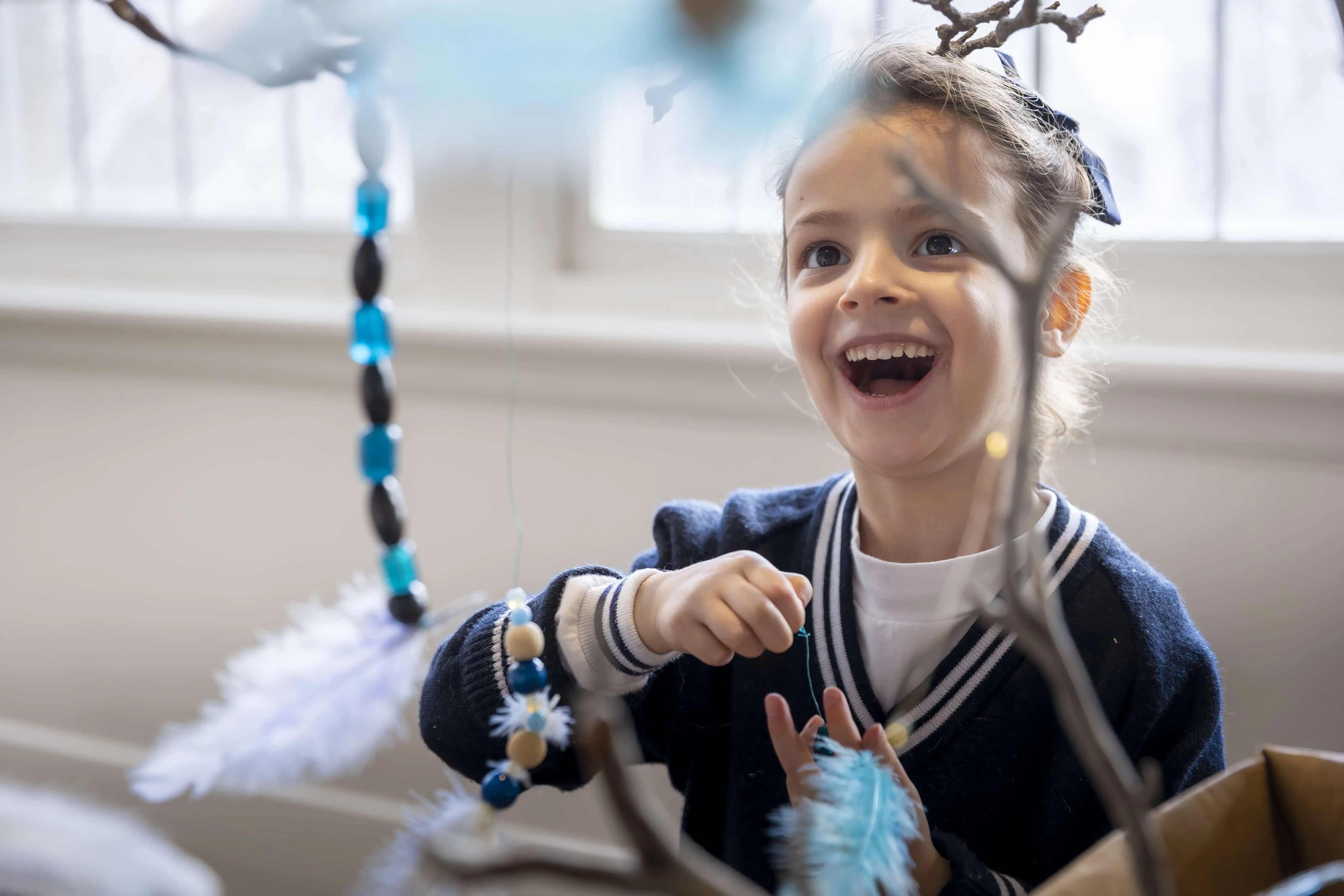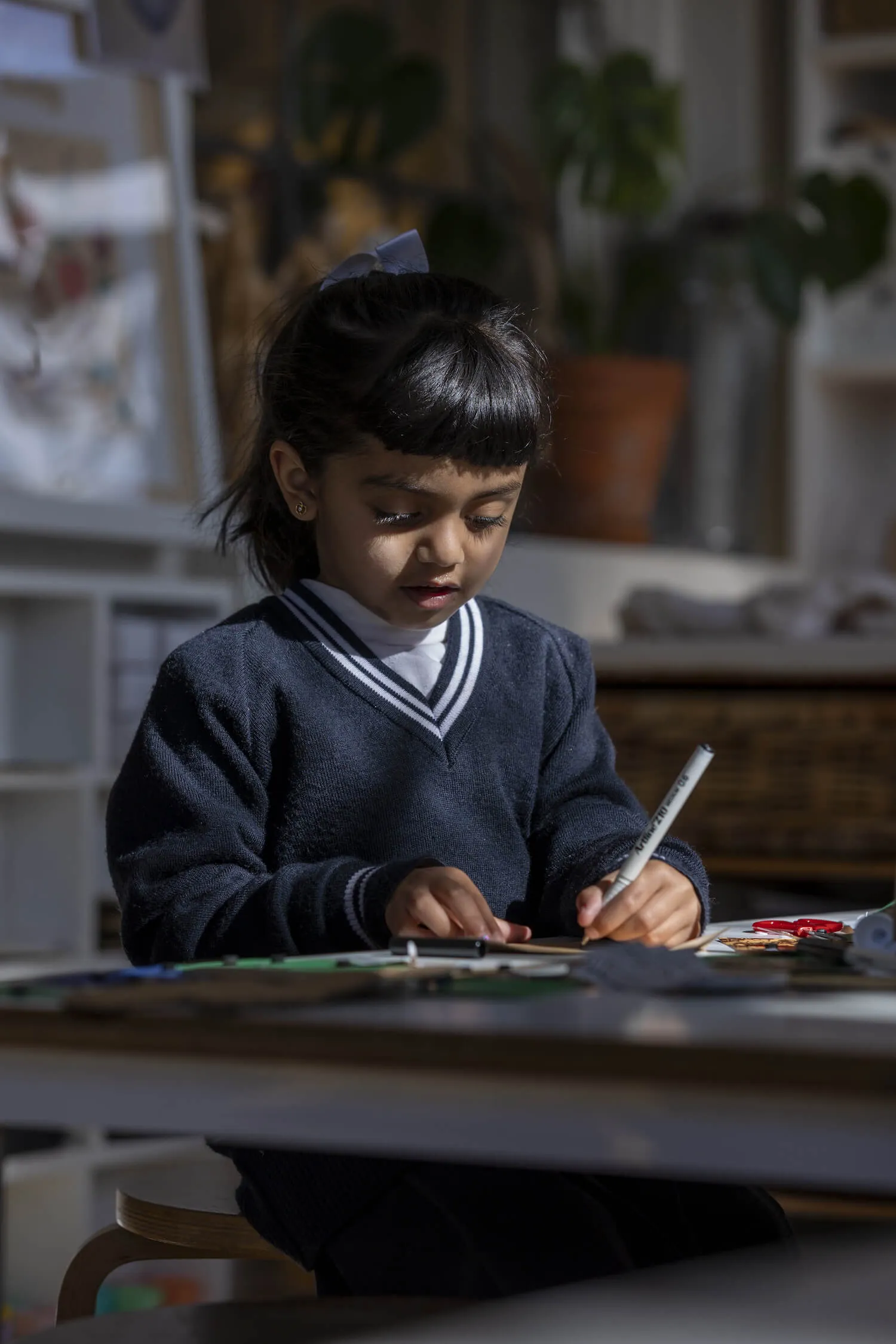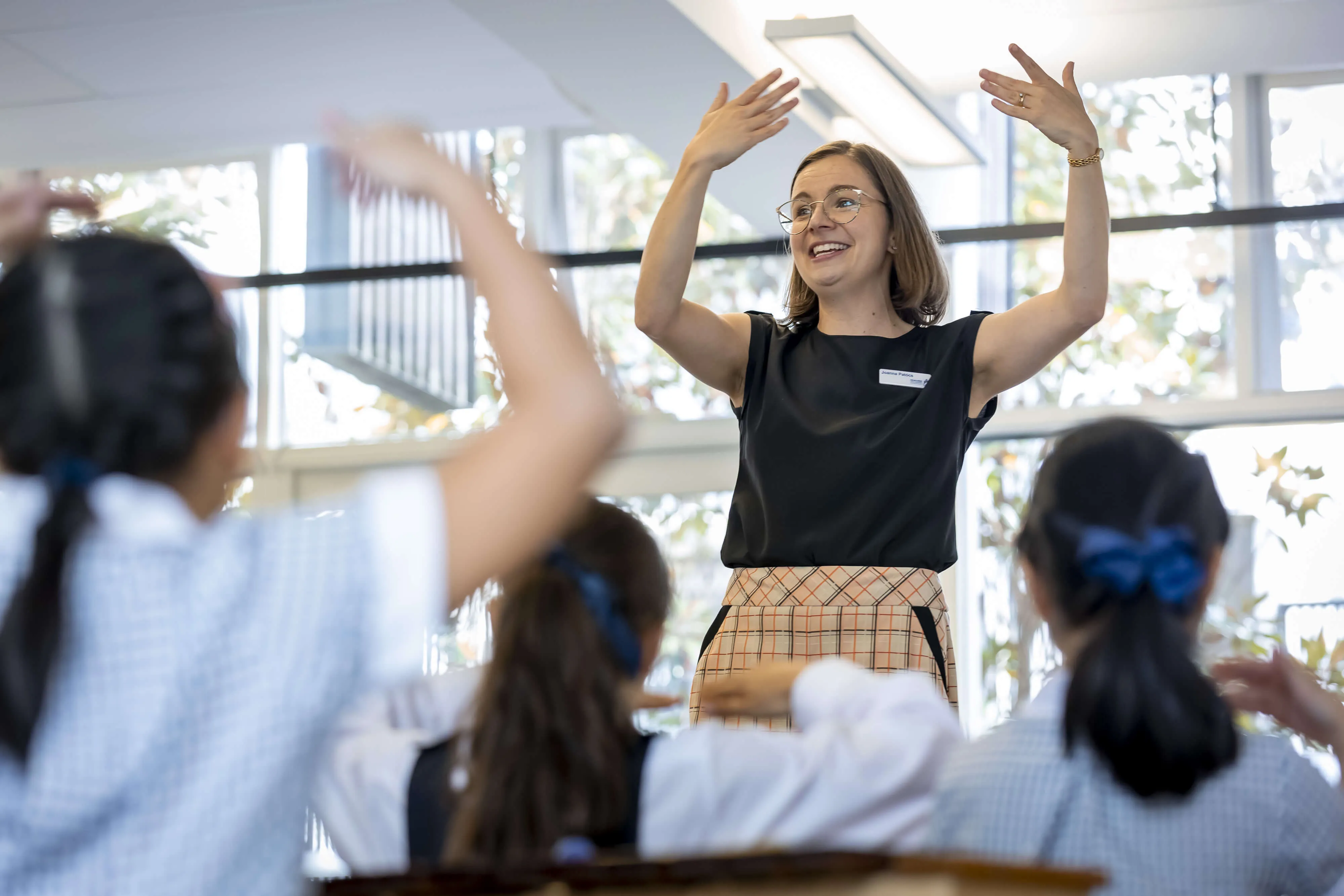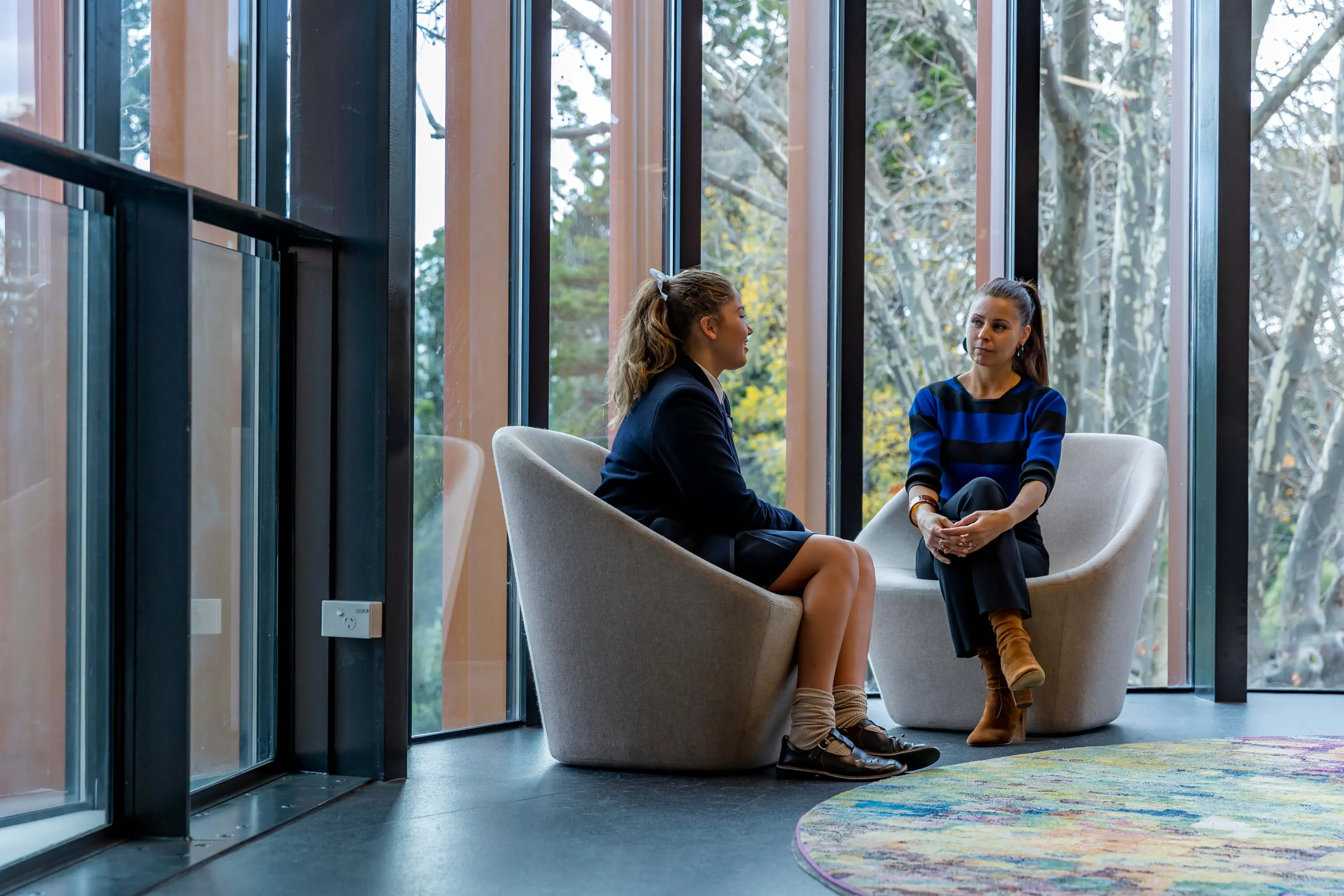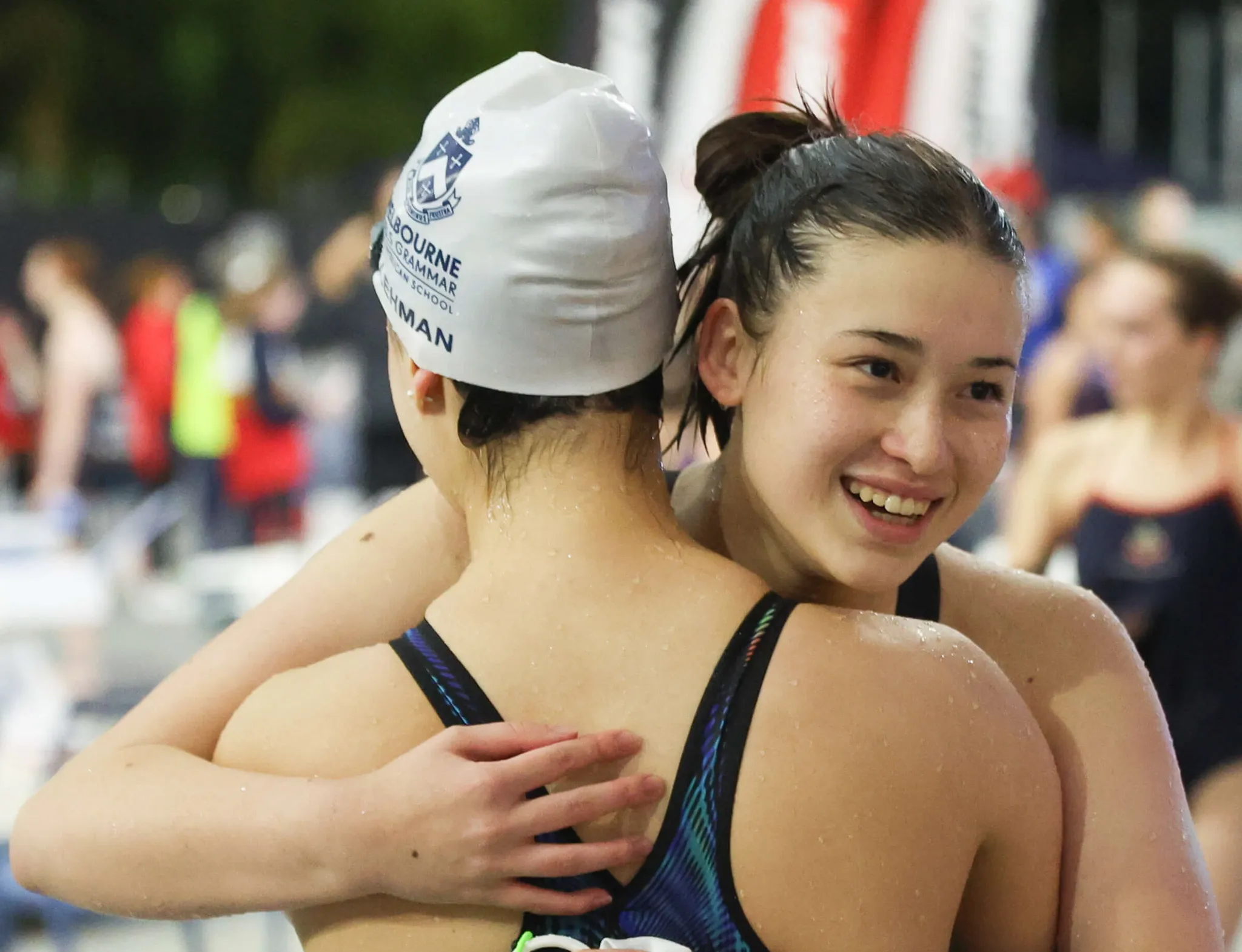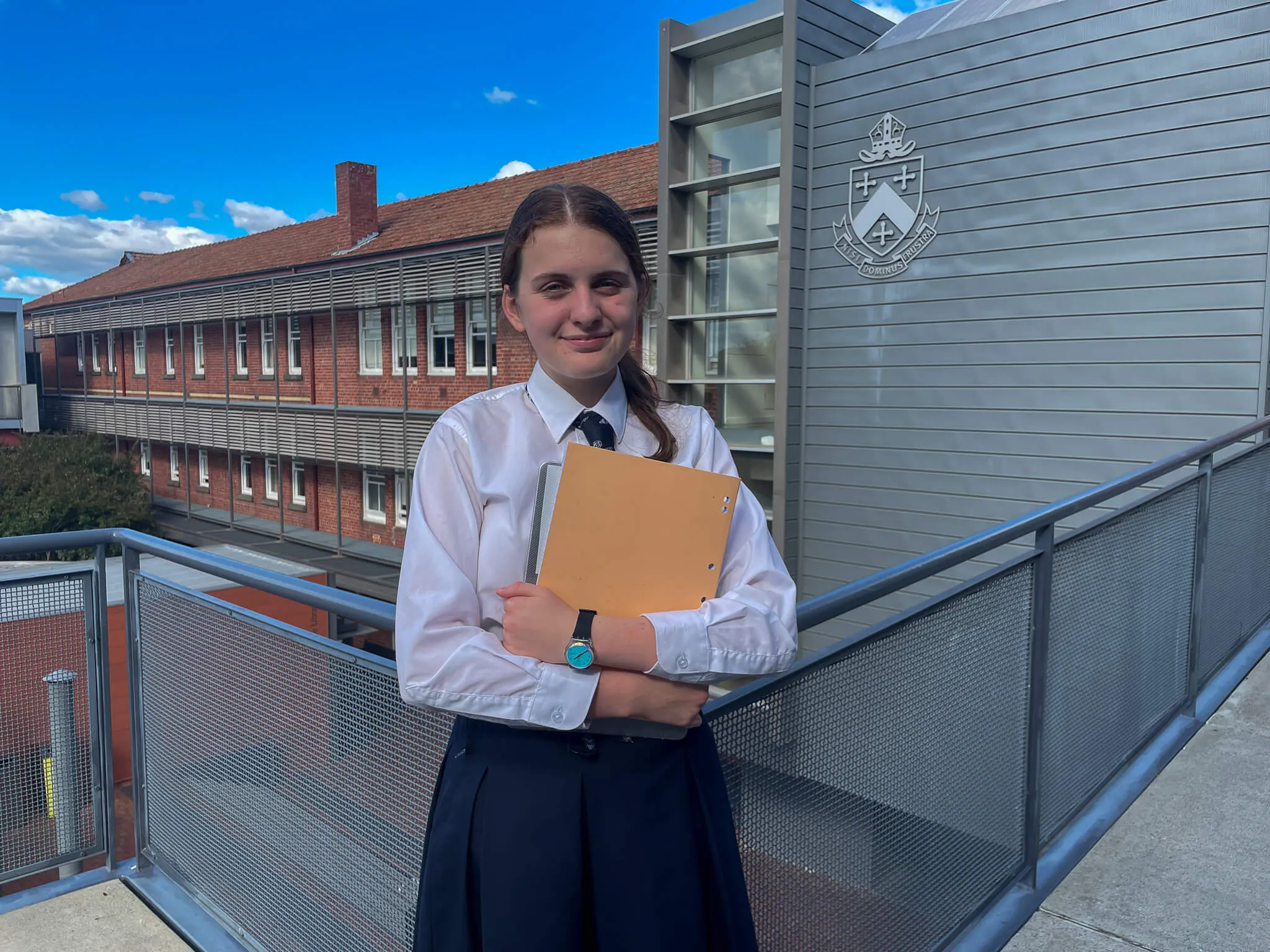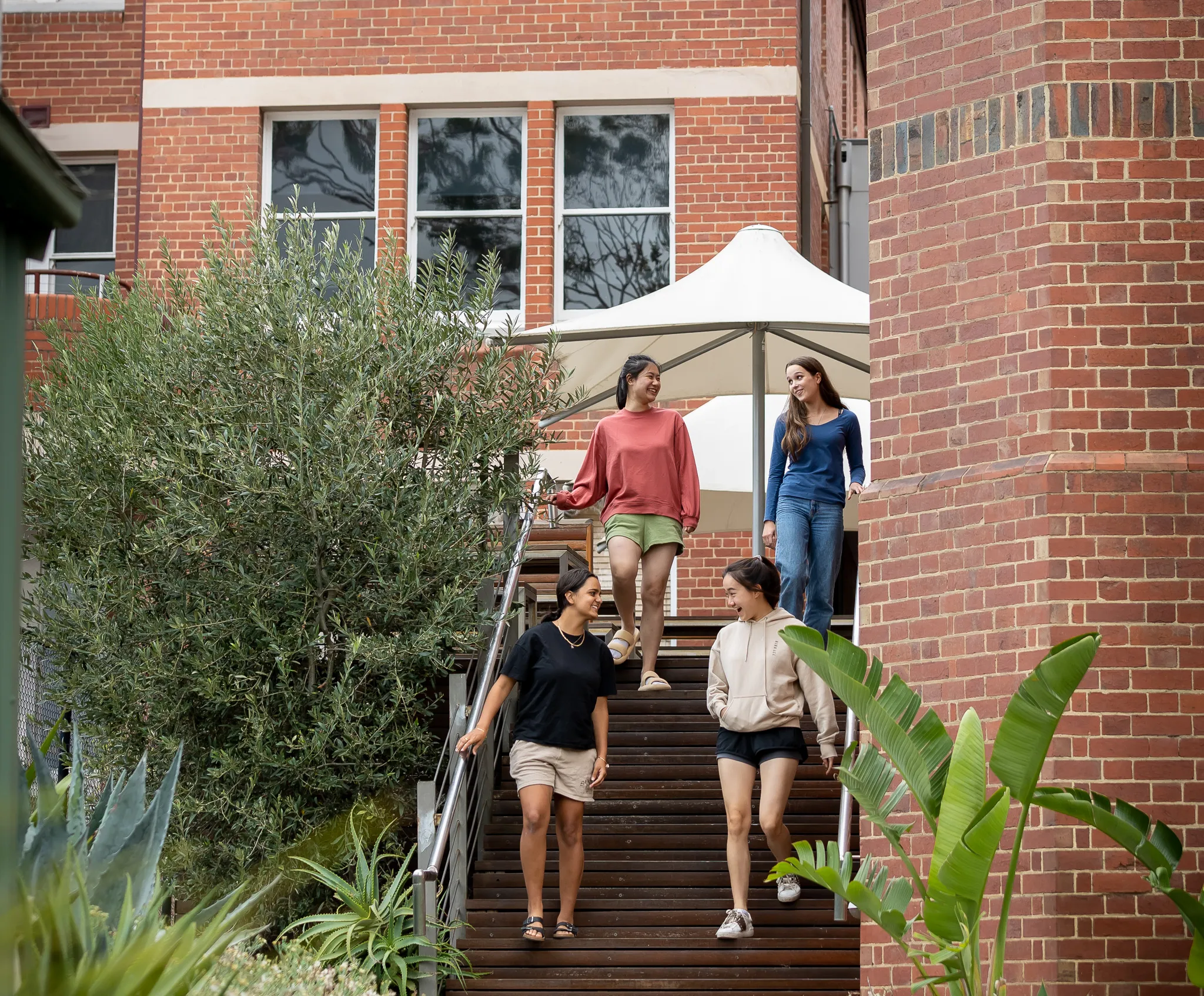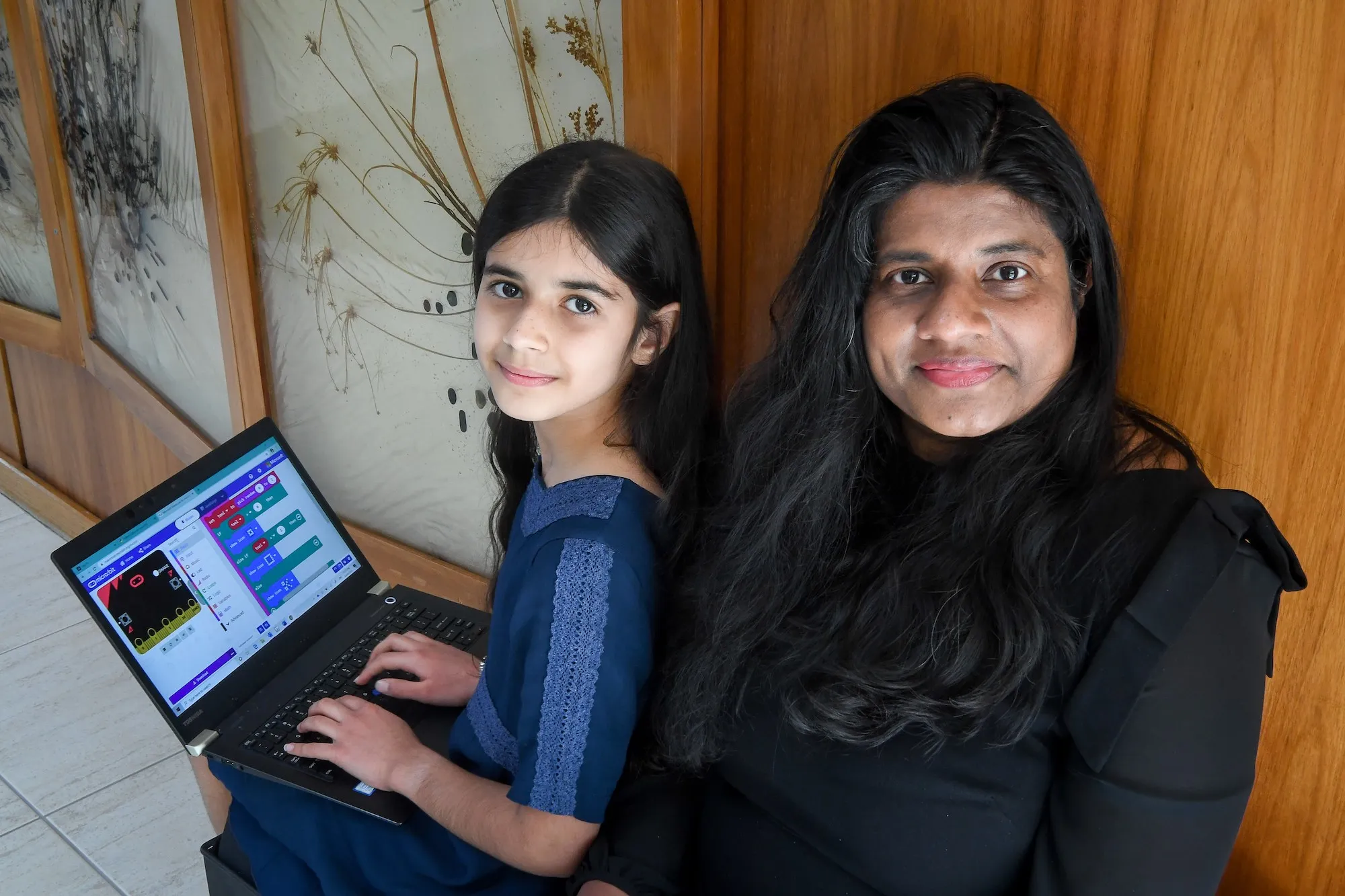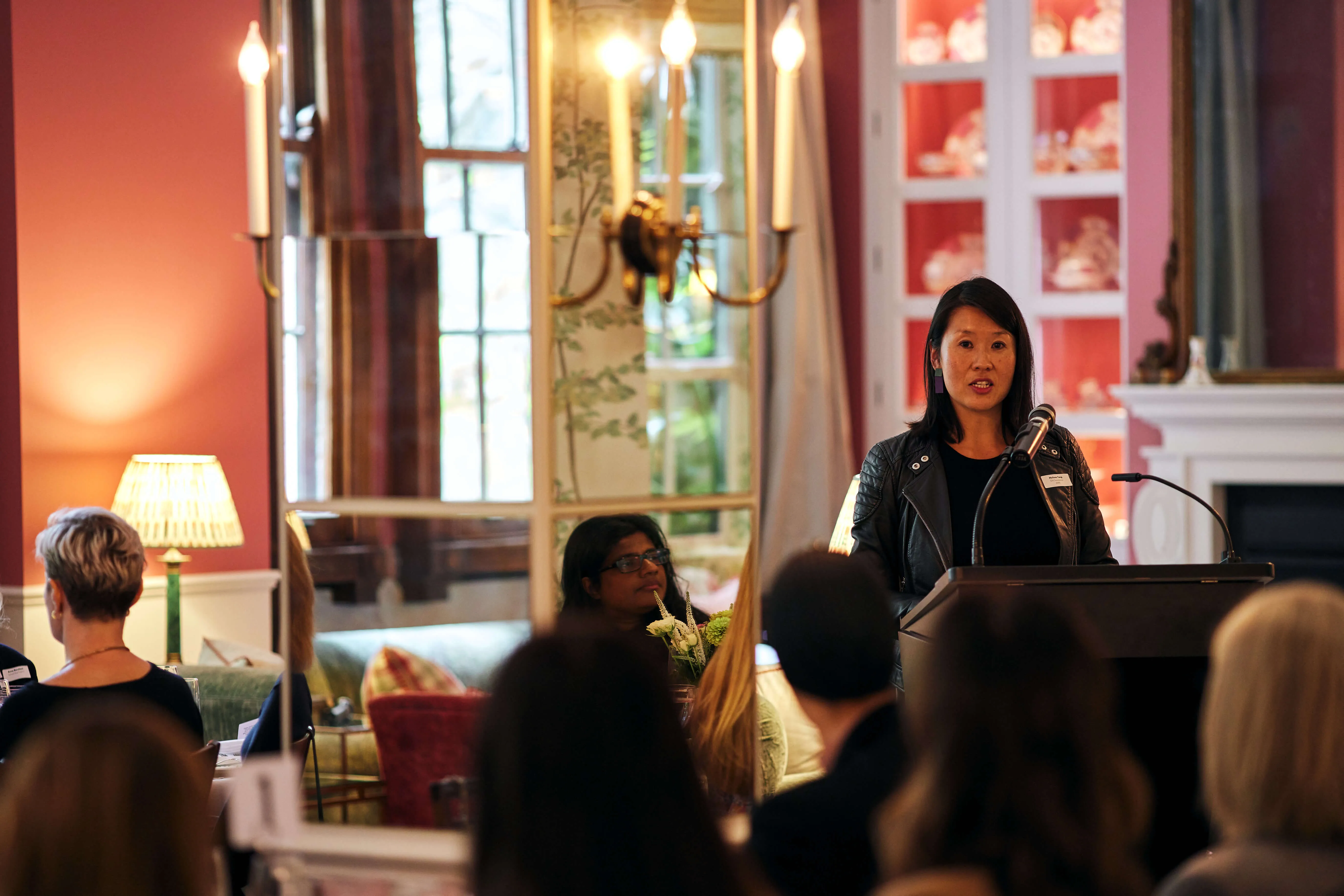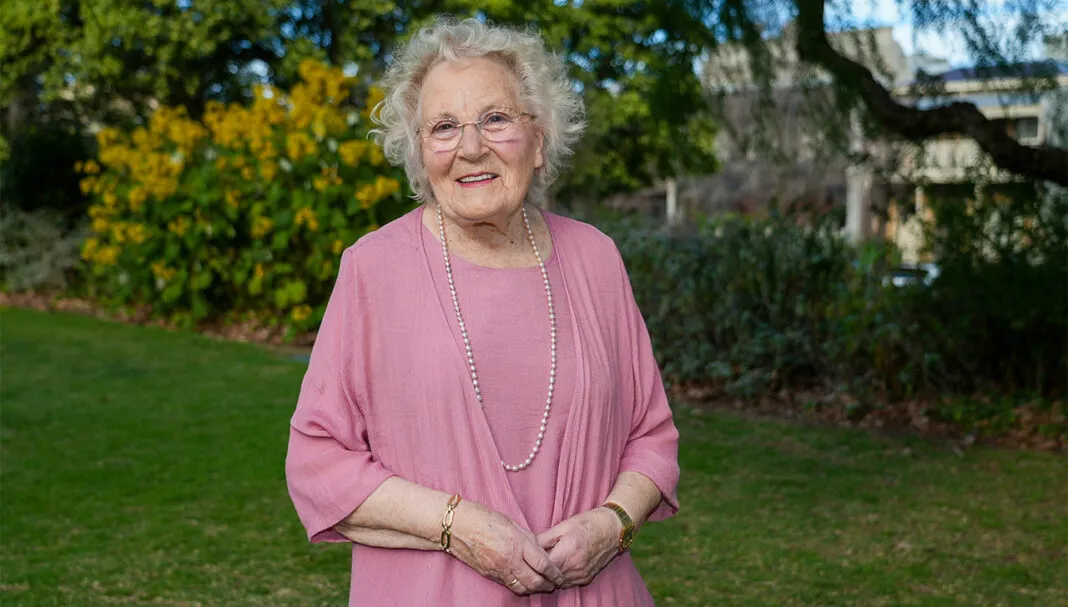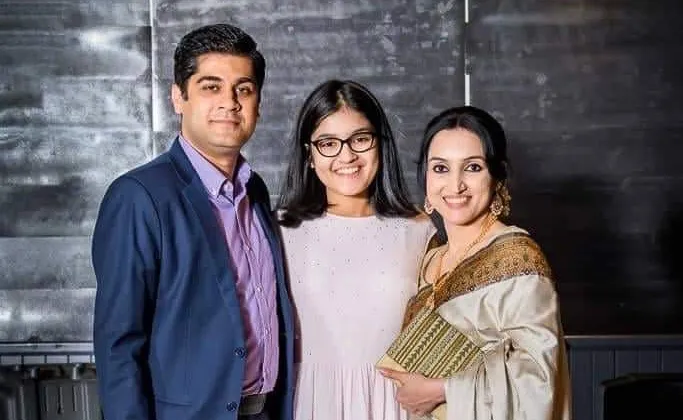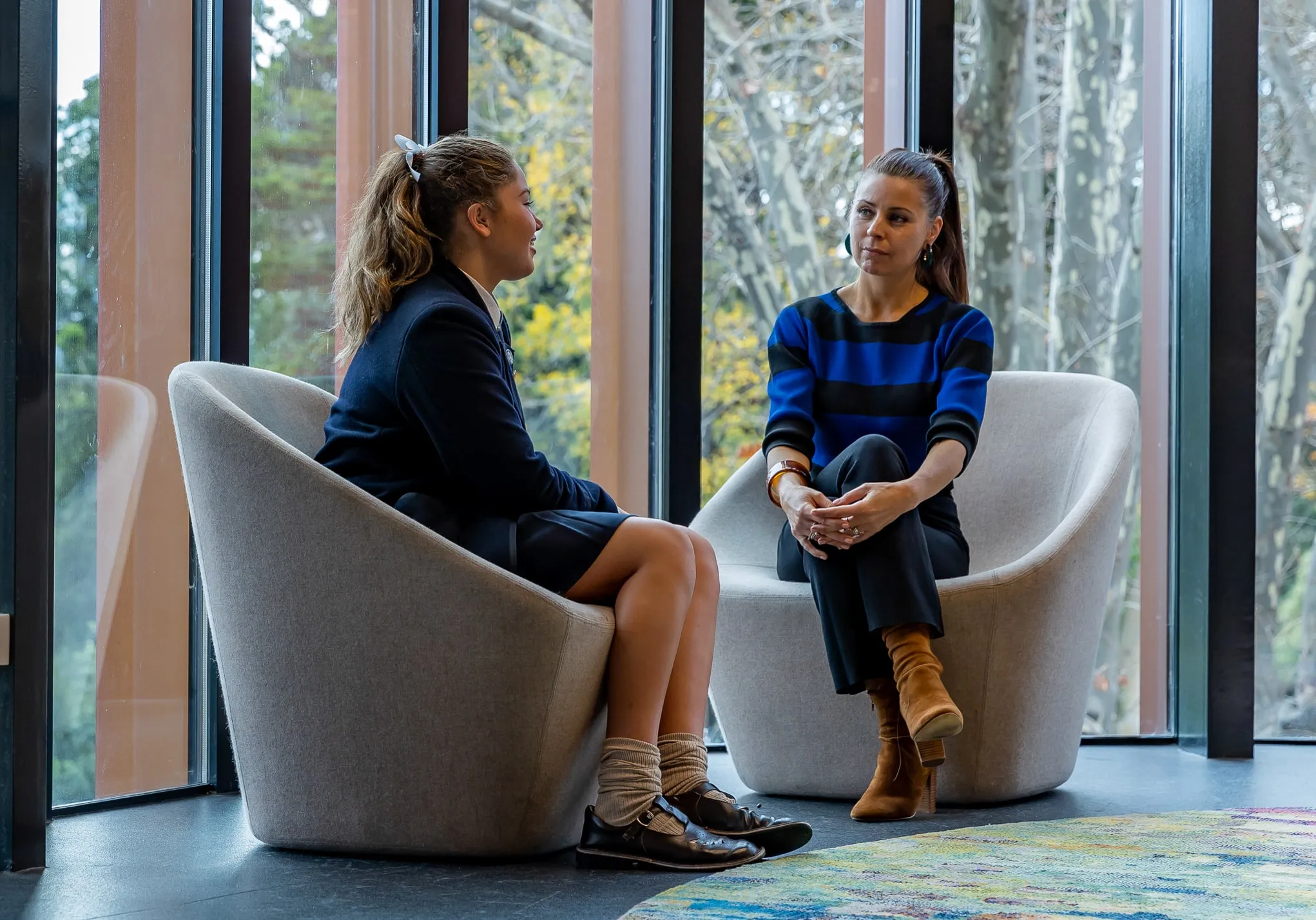

Year 11 student Madeline speaks to MGGS wellbeing coach Rose Jost. Wellbeing coaches are on hand for all Senior Years students.


Year 11 student Madeline speaks to MGGS wellbeing coach Rose Jost. Wellbeing coaches are on hand for all Senior Years students.
Developing Agency Through Wellbeing
Innovative, best-practice educational settings recognise that learning and wellbeing, far from being separate considerations in the student experience, are in fact deeply interwoven and interdependent when it comes to positive outcomes.

Learning and wellbeing occur and flourish within the same cognitive, emotional and social architecture, and both rely on students being motivated, engaged, empowered and agentic in their personal growth. A stressed brain cannot effectively learn, and if learning is defined by any change in behaviour due to experience, then we can see how closely related wellbeing and learning really are.
The MGGS wellbeing model adopts an evidence-based, personalised and very agile approach, that draws on positive and cognitive psychology principles, coaching methodologies, and the tenets of social and emotional learning that are embedded in the MGGS curriculum. At the heart of the model are positive relationships – each student, regardless of existing or emerging wellbeing needs, is known, supported, and encouraged to take charge of their wellbeing and learning. Students are invited to identify their values, strengths and challenges, and to work with educators and wellbeing staff to note what is working, what they are in control of, and where strategies for change might be needed.
Learning and wellbeing occur and flourish within the same cognitive, emotional and social architecture, and both rely on students being motivated, engaged, empowered and agentic in their personal growth. A stressed brain cannot effectively learn, and if learning is defined by any change in behaviour due to experience, then we can see how closely related wellbeing and learning really are.
The MGGS wellbeing model adopts an evidence-based, personalised and very agile approach, that draws on positive and cognitive psychology principles, coaching methodologies, and the tenets of social and emotional learning that are embedded in the MGGS curriculum. At the heart of the model are positive relationships – each student, regardless of existing or emerging wellbeing needs, is known, supported, and encouraged to take charge of their wellbeing and learning. Students are invited to identify their values, strengths and challenges, and to work with educators and wellbeing staff to note what is working, what they are in control of, and where strategies for change might be needed.
Learning and wellbeing occur and flourish within the same cognitive, emotional and social architecture, and both rely on students being motivated, engaged, empowered and agentic in their personal growth. A stressed brain cannot effectively learn, and if learning is defined by any change in behaviour due to experience, then we can see how closely related wellbeing and learning really are.
The MGGS wellbeing model adopts an evidence-based, personalised and very agile approach, that draws on positive and cognitive psychology principles, coaching methodologies, and the tenets of social and emotional learning that are embedded in the MGGS curriculum. At the heart of the model are positive relationships – each student, regardless of existing or emerging wellbeing needs, is known, supported, and encouraged to take charge of their wellbeing and learning. Students are invited to identify their values, strengths and challenges, and to work with educators and wellbeing staff to note what is working, what they are in control of, and where strategies for change might be needed.
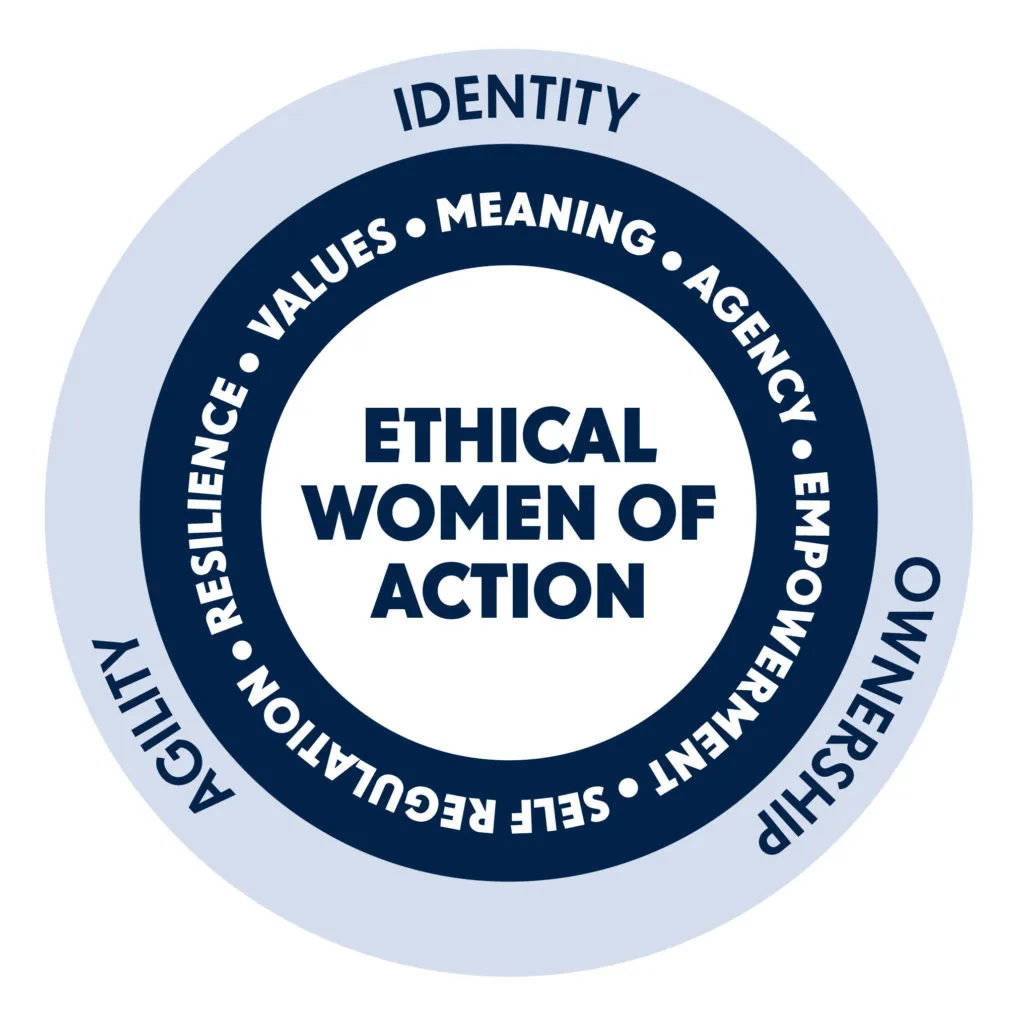




Wellbeing underpins our practice at MGGS, and is applicable to our youngest students from early learning to our oldest as they approach graduation. Developing agency through wellbeing begins in the Middle Years with our holistic Wellbeing Mentor Model. In the Senior Years, students are then introduced to their House Wellbeing Coach, and House Wellbeing Co-ordinator. Together these experienced staff work on a student’s individual wellbeing plan and process. They integrate a ‘circle of care’ that includes teachers, support and co -curricular staff, families and carers and, where needed, the School’s counselling team. Additionally, if a student is receiving external help or services that impact their wellbeing, the School will work to incorporate those needs where appropriate.
Proactivity is key to our wellbeing model. Every student meets regularly with their Wellbeing Coach to establish their individual wellbeing priorities, needs and goals, and together they work towards measurable growth. Self-awareness and self-regulation of one’s wellbeing is the ultimate objective of the wellbeing/coaching relationship, and it’s unique to each student. From a basis of trust, coaches and students work closely to identify areas of strength and challenge in all aspects of the student’s personal wellbeing, including but not limited to their social, emotional, physical, and academic domains. Students are coached towards understanding the why and how of their goals, so that they are then empowered to devise and enact strategies that are rich with personal meaning and purpose. We know that this enhances motivation, engagement and persistence in both learning and wellbeing objectives.
Wellbeing underpins our practice at MGGS, and is applicable to our youngest students from early learning to our oldest as they approach graduation. Developing agency through wellbeing begins in the Middle Years with our holistic Wellbeing Mentor Model. In the Senior Years, students are then introduced to their House Wellbeing Coach, and House Wellbeing Co-ordinator. Together these experienced staff work on a student’s individual wellbeing plan and process. They integrate a ‘circle of care’ that includes teachers, support and co -curricular staff, families and carers and, where needed, the School’s counselling team. Additionally, if a student is receiving external help or services that impact their wellbeing, the School will work to incorporate those needs where appropriate.
Proactivity is key to our wellbeing model. Every student meets regularly with their Wellbeing Coach to establish their individual wellbeing priorities, needs and goals, and together they work towards measurable growth. Self-awareness and self-regulation of one’s wellbeing is the ultimate objective of the wellbeing/coaching relationship, and it’s unique to each student. From a basis of trust, coaches and students work closely to identify areas of strength and challenge in all aspects of the student’s personal wellbeing, including but not limited to their social, emotional, physical, and academic domains. Students are coached towards understanding the why and how of their goals, so that they are then empowered to devise and enact strategies that are rich with personal meaning and purpose. We know that this enhances motivation, engagement and persistence in both learning and wellbeing objectives.
Wellbeing underpins our practice at MGGS, and is applicable to our youngest students from early learning to our oldest as they approach graduation. Developing agency through wellbeing begins in the Middle Years with our holistic Wellbeing Mentor Model. In the Senior Years, students are then introduced to their House Wellbeing Coach, and House Wellbeing Co-ordinator. Together these experienced staff work on a student’s individual wellbeing plan and process. They integrate a ‘circle of care’ that includes teachers, support and co -curricular staff, families and carers and, where needed, the School’s counselling team. Additionally, if a student is receiving external help or services that impact their wellbeing, the School will work to incorporate those needs where appropriate.
Proactivity is key to our wellbeing model. Every student meets regularly with their Wellbeing Coach to establish their individual wellbeing priorities, needs and goals, and together they work towards measurable growth. Self-awareness and self-regulation of one’s wellbeing is the ultimate objective of the wellbeing/coaching relationship, and it’s unique to each student. From a basis of trust, coaches and students work closely to identify areas of strength and challenge in all aspects of the student’s personal wellbeing, including but not limited to their social, emotional, physical, and academic domains. Students are coached towards understanding the why and how of their goals, so that they are then empowered to devise and enact strategies that are rich with personal meaning and purpose. We know that this enhances motivation, engagement and persistence in both learning and wellbeing objectives.

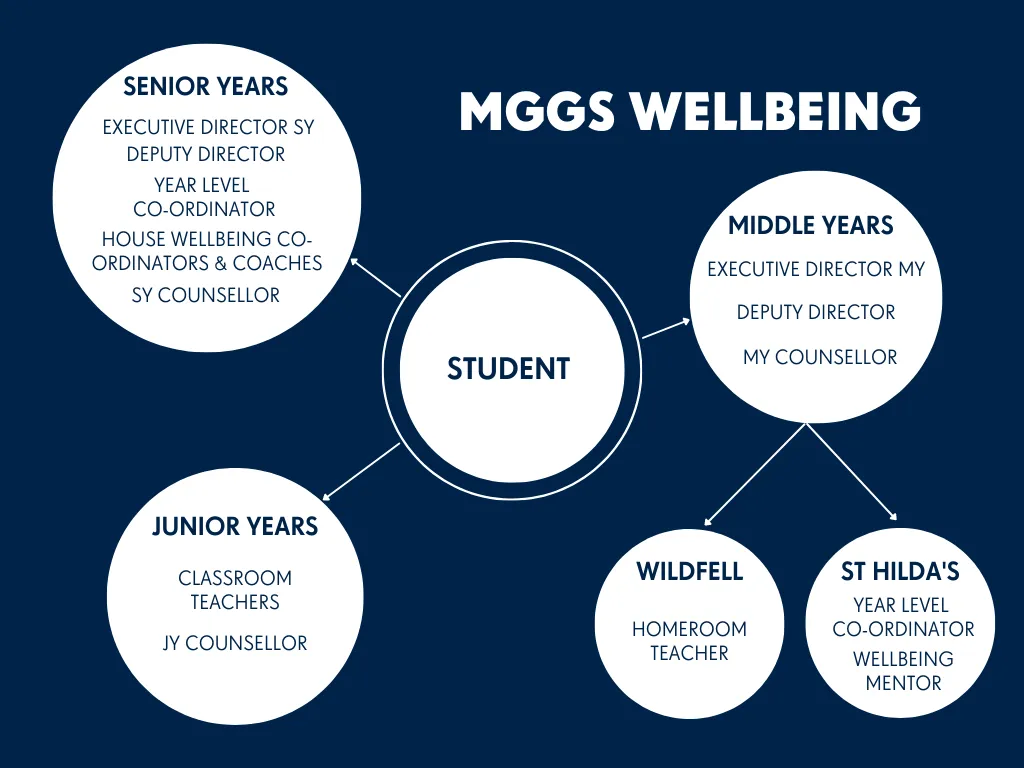





During their time in the Senior Years program, students are coached to build academic and personal confidence, develop active listening and healthy communication skills, devise and adapt strategies for physical, emotional and psychological health, and crucially, collaborate with and help others in the community. The program expands and contracts around the individual student, so that their 1:1 coaching is enhanced and enriched through a cohort-wide wellbeing curriculum that is developmentally appropriate, yet tailored responsively, to the needs of the students. This bilateral approach ensures that students feel individually attended to, while also collaborating with their peers to build the capabilities needed to flourish beyond the school context. Complementary to our bespoke program, MGGS continues to draw on the external expertise of organisations such as Elephant Ed, Vida Financial Literacy and High Performance Mindfulness (HPM) coach Emma Murray, to broaden our students’ wellbeing horizons and equip them with additional, vital life skills that will serve them as they transition to life beyond 'the red brick walls'. HPM, for example, is a program that invites our students to develop the mindsets and skills required to manage stress and find optimal academic success through targeted, ongoing practices they can apply in and out of the classroom.
A recent collaboration with Melbourne Grammar School and Dr Tessa Opie from In Your Skin has seen our Senior Years students take part in a series of Healthy Relationships days across the two campuses. The chance to learn and share experiences around all aspects of interpersonal relationships has been incredibly beneficial for all involved. Student voice and peer-to-peer learning has provided the space for empathy, understanding and a shared vision for building a respectful and safe environment for young people both in and beyond the school context.
During their time in the Senior Years program, students are coached to build academic and personal confidence, develop active listening and healthy communication skills, devise and adapt strategies for physical, emotional and psychological health, and crucially, collaborate with and help others in the community. The program expands and contracts around the individual student, so that their 1:1 coaching is enhanced and enriched through a cohort-wide wellbeing curriculum that is developmentally appropriate, yet tailored responsively, to the needs of the students. This bilateral approach ensures that students feel individually attended to, while also collaborating with their peers to build the capabilities needed to flourish beyond the school context. Complementary to our bespoke program, MGGS continues to draw on the external expertise of organisations such as Elephant Ed, Vida Financial Literacy and High Performance Mindfulness (HPM) coach Emma Murray, to broaden our students’ wellbeing horizons and equip them with additional, vital life skills that will serve them as they transition to life beyond 'the red brick walls'. HPM, for example, is a program that invites our students to develop the mindsets and skills required to manage stress and find optimal academic success through targeted, ongoing practices they can apply in and out of the classroom.
A recent collaboration with Melbourne Grammar School and Dr Tessa Opie from In Your Skin has seen our Senior Years students take part in a series of Healthy Relationships days across the two campuses. The chance to learn and share experiences around all aspects of interpersonal relationships has been incredibly beneficial for all involved. Student voice and peer-to-peer learning has provided the space for empathy, understanding and a shared vision for building a respectful and safe environment for young people both in and beyond the school context.



All of the work done outside of the classroom serves to enhance the student experience, by increasing academic resilience, empathy, collaboration, curiosity and an authentic understanding of how wellbeing and learning elevate each other. Testament to the success of the Senior Years program, many of our recent graduates return to MGGS to work as Academic Coaches and as part of our extensive Artemis programs, sharing the skills of self-management and personalised learning with their younger peers. It is always wonderful to witness the real-world embodiment of the School’s commitment to student wellbeing in the flourishing success of our former Grammarians, along with the passion they demonstrate in passing on these capabilities.
The co-construction and modelling of wellbeing practices by educators and support staff is a vital aspect of the success of our Grammarians. Learning requires vulnerability, curiosity and the courage to fail. The notion of ‘failing forward’ is encouraged in and out of the classroom, and students are supported in their pursuit of lifelong learning skills that can be applied to their interpersonal relationships, career aspirations and the development of empathy, compassion and an understanding of the challenges we all face in life.
All of the work done outside of the classroom serves to enhance the student experience, by increasing academic resilience, empathy, collaboration, curiosity and an authentic understanding of how wellbeing and learning elevate each other. Testament to the success of the Senior Years program, many of our recent graduates return to MGGS to work as Academic Coaches and as part of our extensive Artemis programs, sharing the skills of self-management and personalised learning with their younger peers. It is always wonderful to witness the real-world embodiment of the School’s commitment to student wellbeing in the flourishing success of our former Grammarians, along with the passion they demonstrate in passing on these capabilities.
The co-construction and modelling of wellbeing practices by educators and support staff is a vital aspect of the success of our Grammarians. Learning requires vulnerability, curiosity and the courage to fail. The notion of ‘failing forward’ is encouraged in and out of the classroom, and students are supported in their pursuit of lifelong learning skills that can be applied to their interpersonal relationships, career aspirations and the development of empathy, compassion and an understanding of the challenges we all face in life.
All of the work done outside of the classroom serves to enhance the student experience, by increasing academic resilience, empathy, collaboration, curiosity and an authentic understanding of how wellbeing and learning elevate each other. Testament to the success of the Senior Years program, many of our recent graduates return to MGGS to work as Academic Coaches and as part of our extensive Artemis programs, sharing the skills of self-management and personalised learning with their younger peers. It is always wonderful to witness the real-world embodiment of the School’s commitment to student wellbeing in the flourishing success of our former Grammarians, along with the passion they demonstrate in passing on these capabilities.
The co-construction and modelling of wellbeing practices by educators and support staff is a vital aspect of the success of our Grammarians. Learning requires vulnerability, curiosity and the courage to fail. The notion of ‘failing forward’ is encouraged in and out of the classroom, and students are supported in their pursuit of lifelong learning skills that can be applied to their interpersonal relationships, career aspirations and the development of empathy, compassion and an understanding of the challenges we all face in life.







